AC29180: Auditor's Public Interest Responsibilities Report
VerifiedAdded on 2023/04/25
|17
|4450
|436
Report
AI Summary
This report delves into the critical responsibilities of auditors concerning public interest and audit quality, particularly in the context of potential material misstatements in financial statements. It analyzes the impact of such misstatements on key stakeholders like shareholders, debt funders, suppliers, and employees, highlighting the risks associated with incorrect investment decisions. The report emphasizes the importance of auditor independence, whistleblowing mechanisms, and adherence to ethical guidelines such as APES 110. It draws valuable lessons from the Enron scandal and Arthur Andersen's involvement, underscoring the need for robust accounting and auditing standards, auditor incentives, and independent oversight. Furthermore, the report examines strategies to enhance audit quality, including the role of audit committees and effective internal controls. The report concludes with an overview of the key aspects of auditor responsibilities and audit quality.
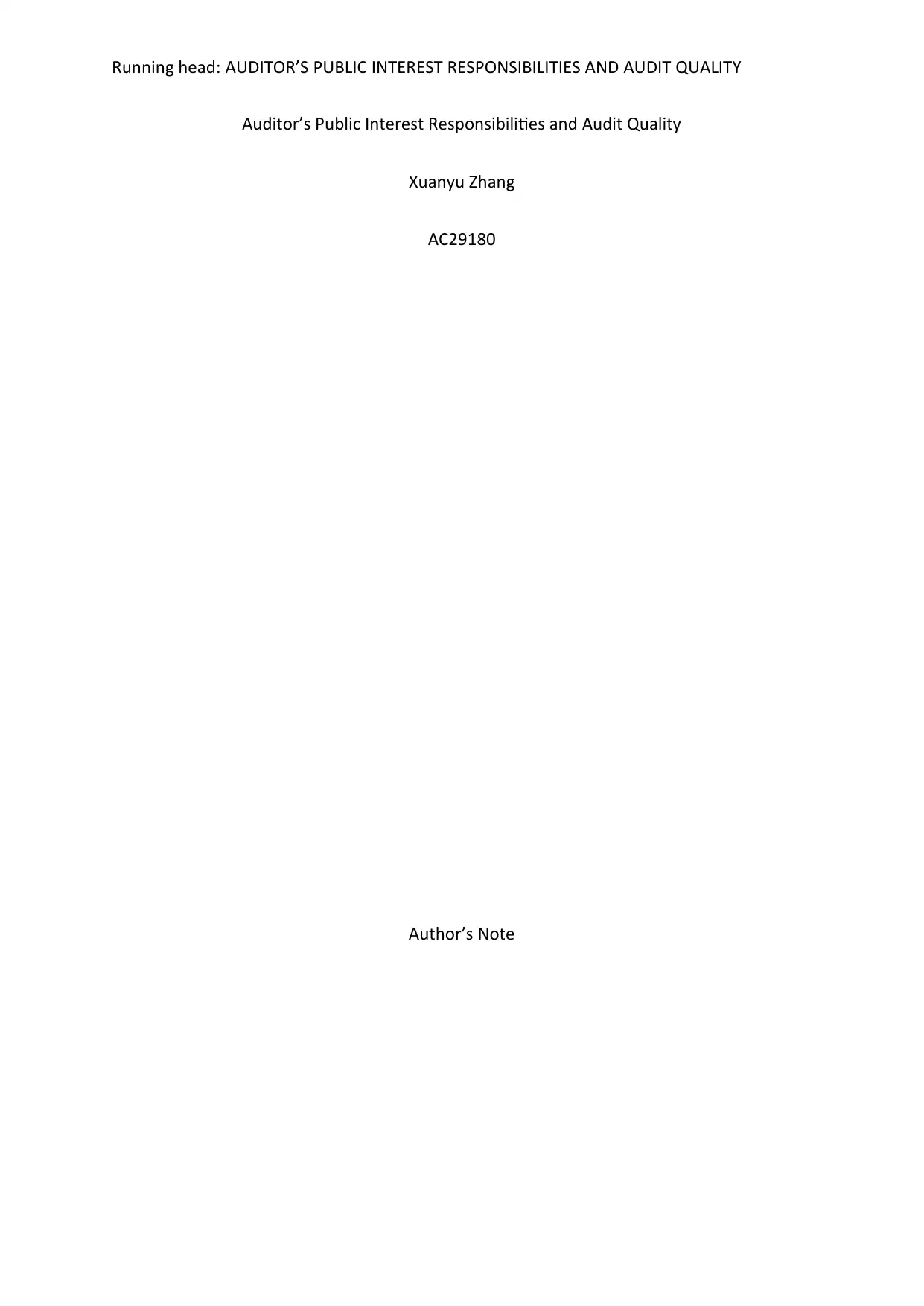
Running head: AUDITOR’S PUBLIC INTEREST RESPONSIBILITIES AND AUDIT QUALITY
Auditor’s Public Interest Responsibilities and Audit Quality
Xuanyu Zhang
AC29180
Author’s Note
Auditor’s Public Interest Responsibilities and Audit Quality
Xuanyu Zhang
AC29180
Author’s Note
Paraphrase This Document
Need a fresh take? Get an instant paraphrase of this document with our AI Paraphraser
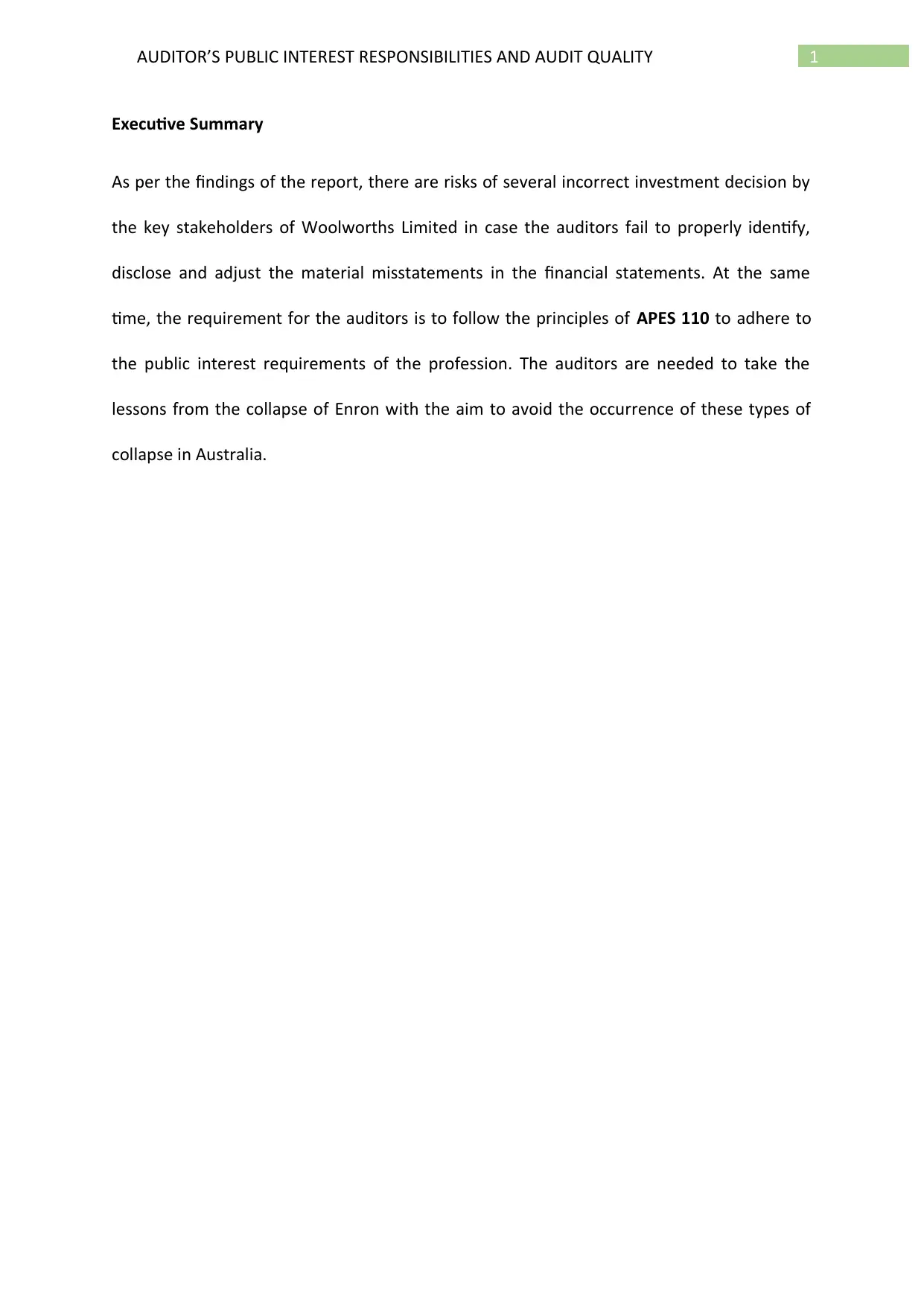
1AUDITOR’S PUBLIC INTEREST RESPONSIBILITIES AND AUDIT QUALITY
Executive Summary
As per the findings of the report, there are risks of several incorrect investment decision by
the key stakeholders of Woolworths Limited in case the auditors fail to properly identify,
disclose and adjust the material misstatements in the financial statements. At the same
time, the requirement for the auditors is to follow the principles of APES 110 to adhere to
the public interest requirements of the profession. The auditors are needed to take the
lessons from the collapse of Enron with the aim to avoid the occurrence of these types of
collapse in Australia.
Executive Summary
As per the findings of the report, there are risks of several incorrect investment decision by
the key stakeholders of Woolworths Limited in case the auditors fail to properly identify,
disclose and adjust the material misstatements in the financial statements. At the same
time, the requirement for the auditors is to follow the principles of APES 110 to adhere to
the public interest requirements of the profession. The auditors are needed to take the
lessons from the collapse of Enron with the aim to avoid the occurrence of these types of
collapse in Australia.
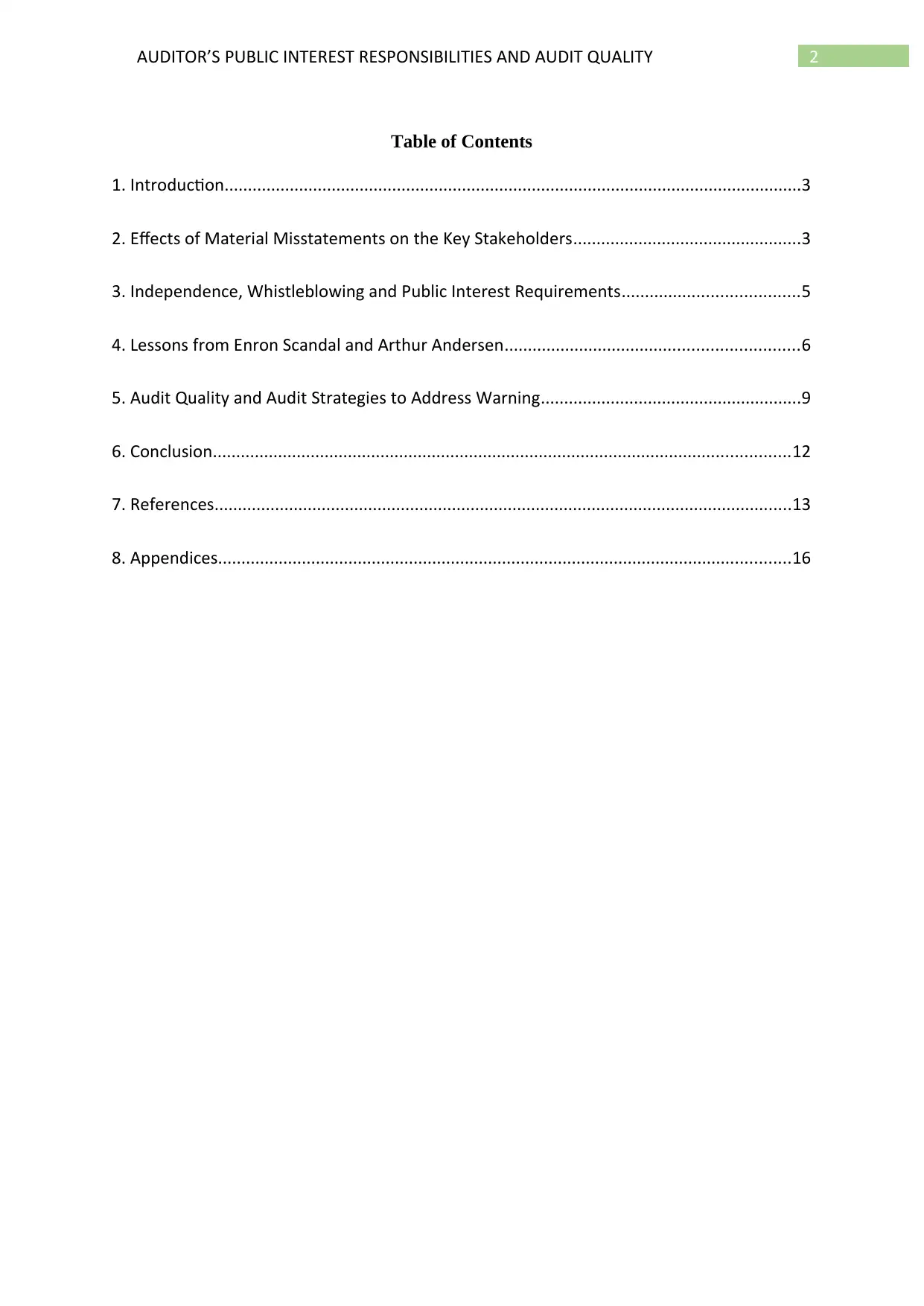
2AUDITOR’S PUBLIC INTEREST RESPONSIBILITIES AND AUDIT QUALITY
Table of Contents
1. Introduction............................................................................................................................3
2. Effects of Material Misstatements on the Key Stakeholders.................................................3
3. Independence, Whistleblowing and Public Interest Requirements......................................5
4. Lessons from Enron Scandal and Arthur Andersen...............................................................6
5. Audit Quality and Audit Strategies to Address Warning........................................................9
6. Conclusion............................................................................................................................12
7. References............................................................................................................................13
8. Appendices...........................................................................................................................16
Table of Contents
1. Introduction............................................................................................................................3
2. Effects of Material Misstatements on the Key Stakeholders.................................................3
3. Independence, Whistleblowing and Public Interest Requirements......................................5
4. Lessons from Enron Scandal and Arthur Andersen...............................................................6
5. Audit Quality and Audit Strategies to Address Warning........................................................9
6. Conclusion............................................................................................................................12
7. References............................................................................................................................13
8. Appendices...........................................................................................................................16
⊘ This is a preview!⊘
Do you want full access?
Subscribe today to unlock all pages.

Trusted by 1+ million students worldwide
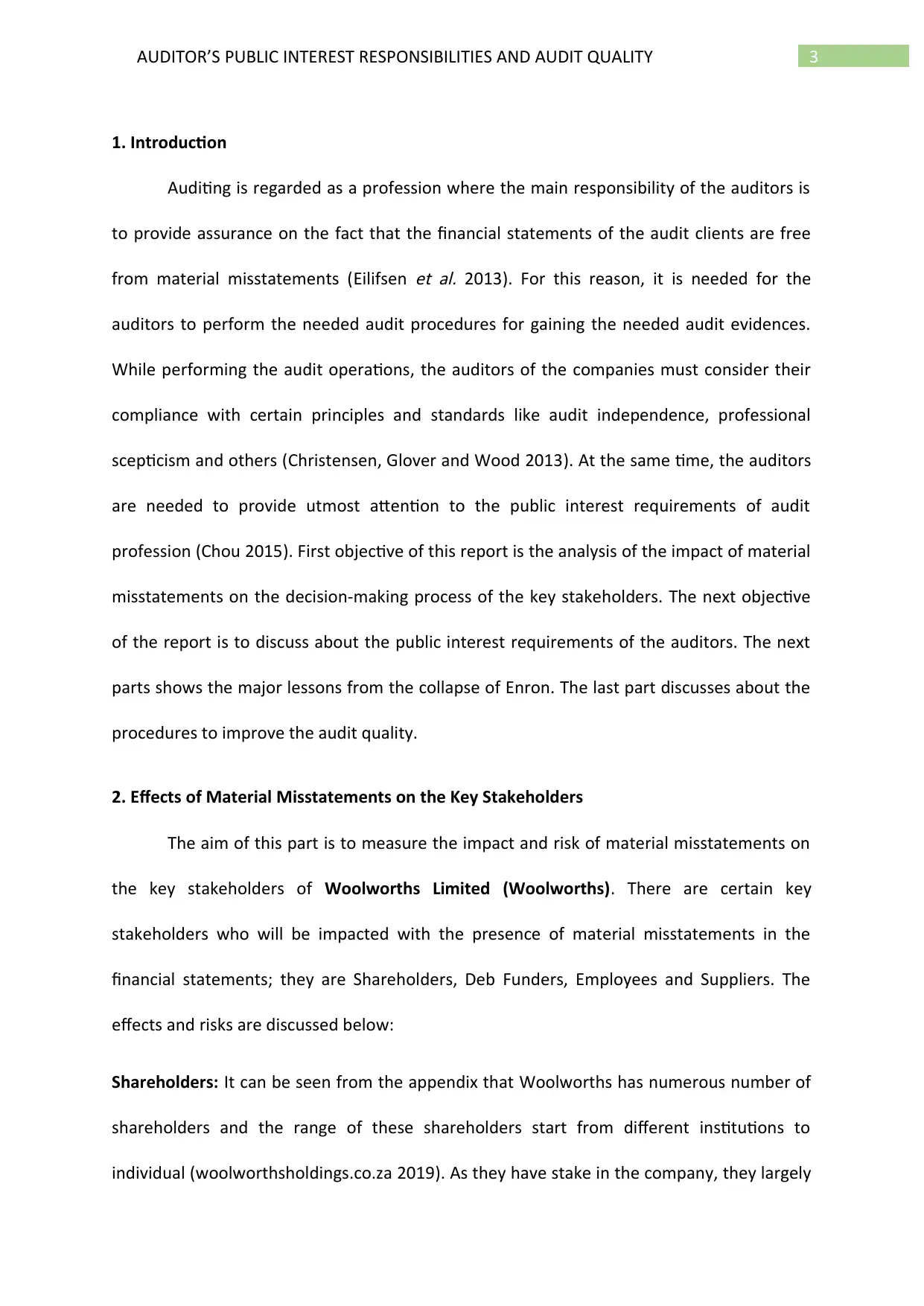
3AUDITOR’S PUBLIC INTEREST RESPONSIBILITIES AND AUDIT QUALITY
1. Introduction
Auditing is regarded as a profession where the main responsibility of the auditors is
to provide assurance on the fact that the financial statements of the audit clients are free
from material misstatements (Eilifsen
et al. 2013). For this reason, it is needed for the
auditors to perform the needed audit procedures for gaining the needed audit evidences.
While performing the audit operations, the auditors of the companies must consider their
compliance with certain principles and standards like audit independence, professional
scepticism and others (Christensen, Glover and Wood 2013). At the same time, the auditors
are needed to provide utmost attention to the public interest requirements of audit
profession (Chou 2015). First objective of this report is the analysis of the impact of material
misstatements on the decision-making process of the key stakeholders. The next objective
of the report is to discuss about the public interest requirements of the auditors. The next
parts shows the major lessons from the collapse of Enron. The last part discusses about the
procedures to improve the audit quality.
2. Effects of Material Misstatements on the Key Stakeholders
The aim of this part is to measure the impact and risk of material misstatements on
the key stakeholders of Woolworths Limited (Woolworths). There are certain key
stakeholders who will be impacted with the presence of material misstatements in the
financial statements; they are Shareholders, Deb Funders, Employees and Suppliers. The
effects and risks are discussed below:
Shareholders: It can be seen from the appendix that Woolworths has numerous number of
shareholders and the range of these shareholders start from different institutions to
individual (woolworthsholdings.co.za 2019). As they have stake in the company, they largely
1. Introduction
Auditing is regarded as a profession where the main responsibility of the auditors is
to provide assurance on the fact that the financial statements of the audit clients are free
from material misstatements (Eilifsen
et al. 2013). For this reason, it is needed for the
auditors to perform the needed audit procedures for gaining the needed audit evidences.
While performing the audit operations, the auditors of the companies must consider their
compliance with certain principles and standards like audit independence, professional
scepticism and others (Christensen, Glover and Wood 2013). At the same time, the auditors
are needed to provide utmost attention to the public interest requirements of audit
profession (Chou 2015). First objective of this report is the analysis of the impact of material
misstatements on the decision-making process of the key stakeholders. The next objective
of the report is to discuss about the public interest requirements of the auditors. The next
parts shows the major lessons from the collapse of Enron. The last part discusses about the
procedures to improve the audit quality.
2. Effects of Material Misstatements on the Key Stakeholders
The aim of this part is to measure the impact and risk of material misstatements on
the key stakeholders of Woolworths Limited (Woolworths). There are certain key
stakeholders who will be impacted with the presence of material misstatements in the
financial statements; they are Shareholders, Deb Funders, Employees and Suppliers. The
effects and risks are discussed below:
Shareholders: It can be seen from the appendix that Woolworths has numerous number of
shareholders and the range of these shareholders start from different institutions to
individual (woolworthsholdings.co.za 2019). As they have stake in the company, they largely
Paraphrase This Document
Need a fresh take? Get an instant paraphrase of this document with our AI Paraphraser
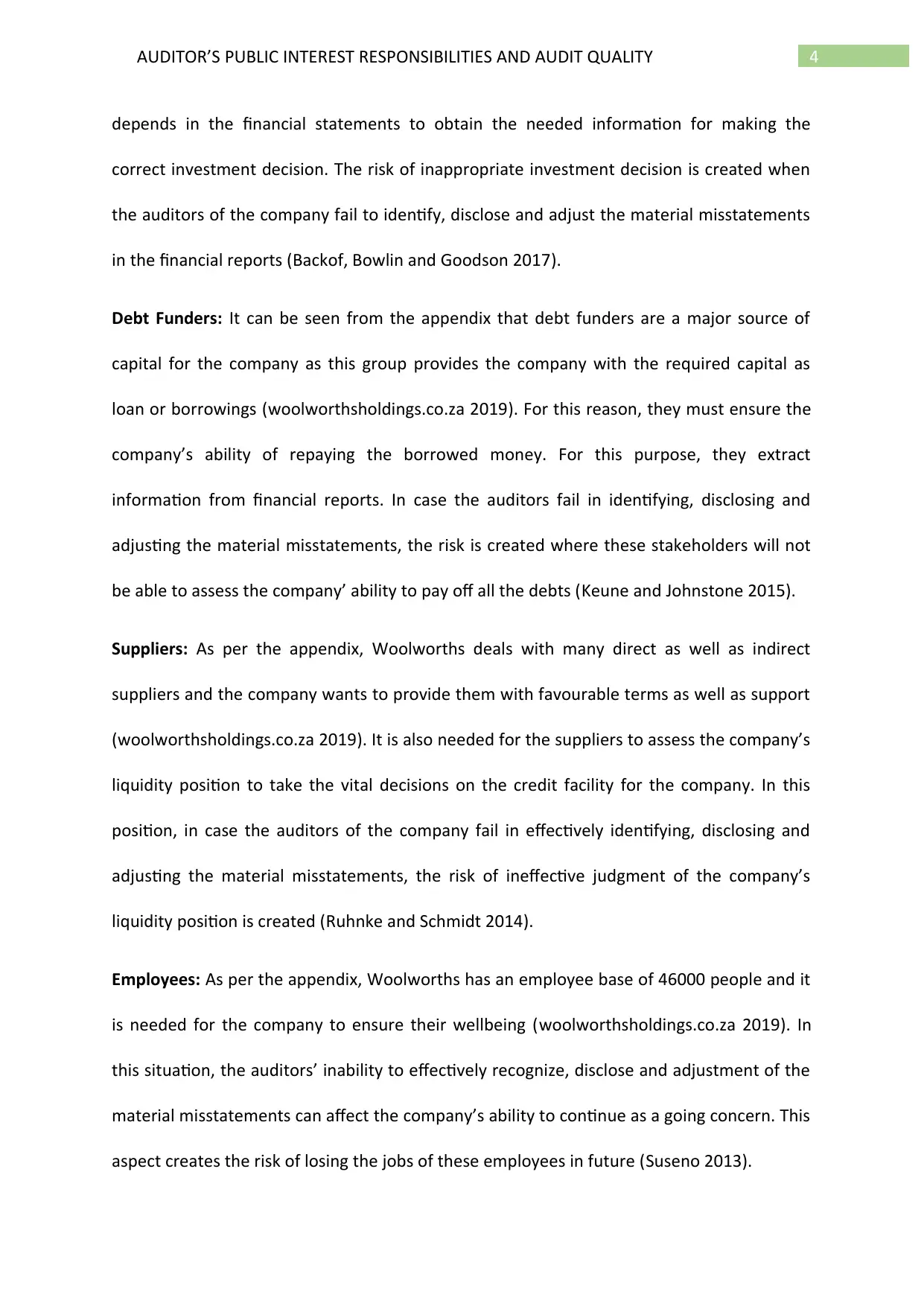
4AUDITOR’S PUBLIC INTEREST RESPONSIBILITIES AND AUDIT QUALITY
depends in the financial statements to obtain the needed information for making the
correct investment decision. The risk of inappropriate investment decision is created when
the auditors of the company fail to identify, disclose and adjust the material misstatements
in the financial reports (Backof, Bowlin and Goodson 2017).
Debt Funders: It can be seen from the appendix that debt funders are a major source of
capital for the company as this group provides the company with the required capital as
loan or borrowings (woolworthsholdings.co.za 2019). For this reason, they must ensure the
company’s ability of repaying the borrowed money. For this purpose, they extract
information from financial reports. In case the auditors fail in identifying, disclosing and
adjusting the material misstatements, the risk is created where these stakeholders will not
be able to assess the company’ ability to pay off all the debts (Keune and Johnstone 2015).
Suppliers: As per the appendix, Woolworths deals with many direct as well as indirect
suppliers and the company wants to provide them with favourable terms as well as support
(woolworthsholdings.co.za 2019). It is also needed for the suppliers to assess the company’s
liquidity position to take the vital decisions on the credit facility for the company. In this
position, in case the auditors of the company fail in effectively identifying, disclosing and
adjusting the material misstatements, the risk of ineffective judgment of the company’s
liquidity position is created (Ruhnke and Schmidt 2014).
Employees: As per the appendix, Woolworths has an employee base of 46000 people and it
is needed for the company to ensure their wellbeing (woolworthsholdings.co.za 2019). In
this situation, the auditors’ inability to effectively recognize, disclose and adjustment of the
material misstatements can affect the company’s ability to continue as a going concern. This
aspect creates the risk of losing the jobs of these employees in future (Suseno 2013).
depends in the financial statements to obtain the needed information for making the
correct investment decision. The risk of inappropriate investment decision is created when
the auditors of the company fail to identify, disclose and adjust the material misstatements
in the financial reports (Backof, Bowlin and Goodson 2017).
Debt Funders: It can be seen from the appendix that debt funders are a major source of
capital for the company as this group provides the company with the required capital as
loan or borrowings (woolworthsholdings.co.za 2019). For this reason, they must ensure the
company’s ability of repaying the borrowed money. For this purpose, they extract
information from financial reports. In case the auditors fail in identifying, disclosing and
adjusting the material misstatements, the risk is created where these stakeholders will not
be able to assess the company’ ability to pay off all the debts (Keune and Johnstone 2015).
Suppliers: As per the appendix, Woolworths deals with many direct as well as indirect
suppliers and the company wants to provide them with favourable terms as well as support
(woolworthsholdings.co.za 2019). It is also needed for the suppliers to assess the company’s
liquidity position to take the vital decisions on the credit facility for the company. In this
position, in case the auditors of the company fail in effectively identifying, disclosing and
adjusting the material misstatements, the risk of ineffective judgment of the company’s
liquidity position is created (Ruhnke and Schmidt 2014).
Employees: As per the appendix, Woolworths has an employee base of 46000 people and it
is needed for the company to ensure their wellbeing (woolworthsholdings.co.za 2019). In
this situation, the auditors’ inability to effectively recognize, disclose and adjustment of the
material misstatements can affect the company’s ability to continue as a going concern. This
aspect creates the risk of losing the jobs of these employees in future (Suseno 2013).
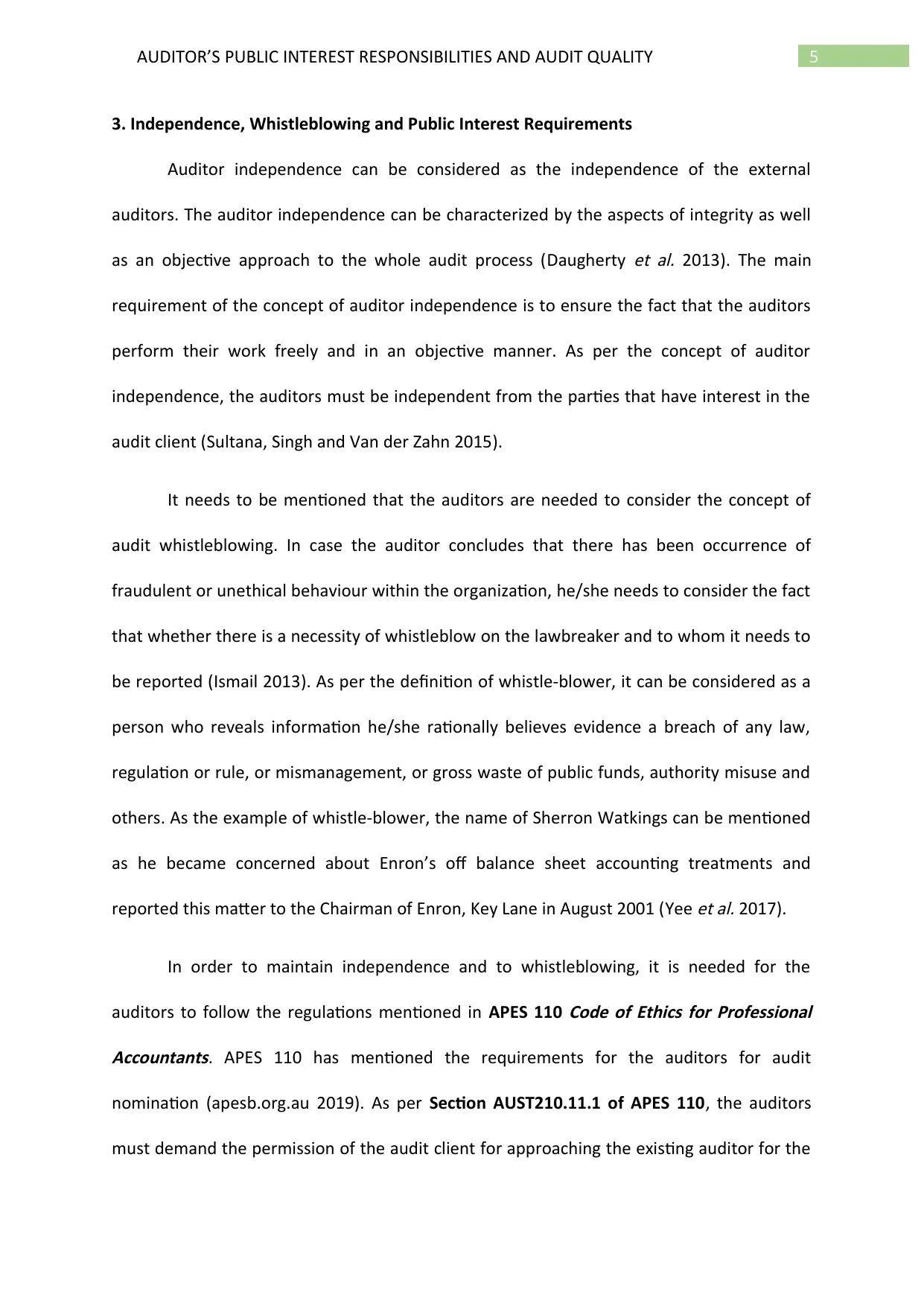
5AUDITOR’S PUBLIC INTEREST RESPONSIBILITIES AND AUDIT QUALITY
3. Independence, Whistleblowing and Public Interest Requirements
Auditor independence can be considered as the independence of the external
auditors. The auditor independence can be characterized by the aspects of integrity as well
as an objective approach to the whole audit process (Daugherty
et al. 2013). The main
requirement of the concept of auditor independence is to ensure the fact that the auditors
perform their work freely and in an objective manner. As per the concept of auditor
independence, the auditors must be independent from the parties that have interest in the
audit client (Sultana, Singh and Van der Zahn 2015).
It needs to be mentioned that the auditors are needed to consider the concept of
audit whistleblowing. In case the auditor concludes that there has been occurrence of
fraudulent or unethical behaviour within the organization, he/she needs to consider the fact
that whether there is a necessity of whistleblow on the lawbreaker and to whom it needs to
be reported (Ismail 2013). As per the definition of whistle-blower, it can be considered as a
person who reveals information he/she rationally believes evidence a breach of any law,
regulation or rule, or mismanagement, or gross waste of public funds, authority misuse and
others. As the example of whistle-blower, the name of Sherron Watkings can be mentioned
as he became concerned about Enron’s off balance sheet accounting treatments and
reported this matter to the Chairman of Enron, Key Lane in August 2001 (Yee
et al. 2017).
In order to maintain independence and to whistleblowing, it is needed for the
auditors to follow the regulations mentioned in APES 110
Code of Ethics for Professional
Accountants. APES 110 has mentioned the requirements for the auditors for audit
nomination (apesb.org.au 2019). As per Section AUST210.11.1 of APES 110, the auditors
must demand the permission of the audit client for approaching the existing auditor for the
3. Independence, Whistleblowing and Public Interest Requirements
Auditor independence can be considered as the independence of the external
auditors. The auditor independence can be characterized by the aspects of integrity as well
as an objective approach to the whole audit process (Daugherty
et al. 2013). The main
requirement of the concept of auditor independence is to ensure the fact that the auditors
perform their work freely and in an objective manner. As per the concept of auditor
independence, the auditors must be independent from the parties that have interest in the
audit client (Sultana, Singh and Van der Zahn 2015).
It needs to be mentioned that the auditors are needed to consider the concept of
audit whistleblowing. In case the auditor concludes that there has been occurrence of
fraudulent or unethical behaviour within the organization, he/she needs to consider the fact
that whether there is a necessity of whistleblow on the lawbreaker and to whom it needs to
be reported (Ismail 2013). As per the definition of whistle-blower, it can be considered as a
person who reveals information he/she rationally believes evidence a breach of any law,
regulation or rule, or mismanagement, or gross waste of public funds, authority misuse and
others. As the example of whistle-blower, the name of Sherron Watkings can be mentioned
as he became concerned about Enron’s off balance sheet accounting treatments and
reported this matter to the Chairman of Enron, Key Lane in August 2001 (Yee
et al. 2017).
In order to maintain independence and to whistleblowing, it is needed for the
auditors to follow the regulations mentioned in APES 110
Code of Ethics for Professional
Accountants. APES 110 has mentioned the requirements for the auditors for audit
nomination (apesb.org.au 2019). As per Section AUST210.11.1 of APES 110, the auditors
must demand the permission of the audit client for approaching the existing auditor for the
⊘ This is a preview!⊘
Do you want full access?
Subscribe today to unlock all pages.

Trusted by 1+ million students worldwide
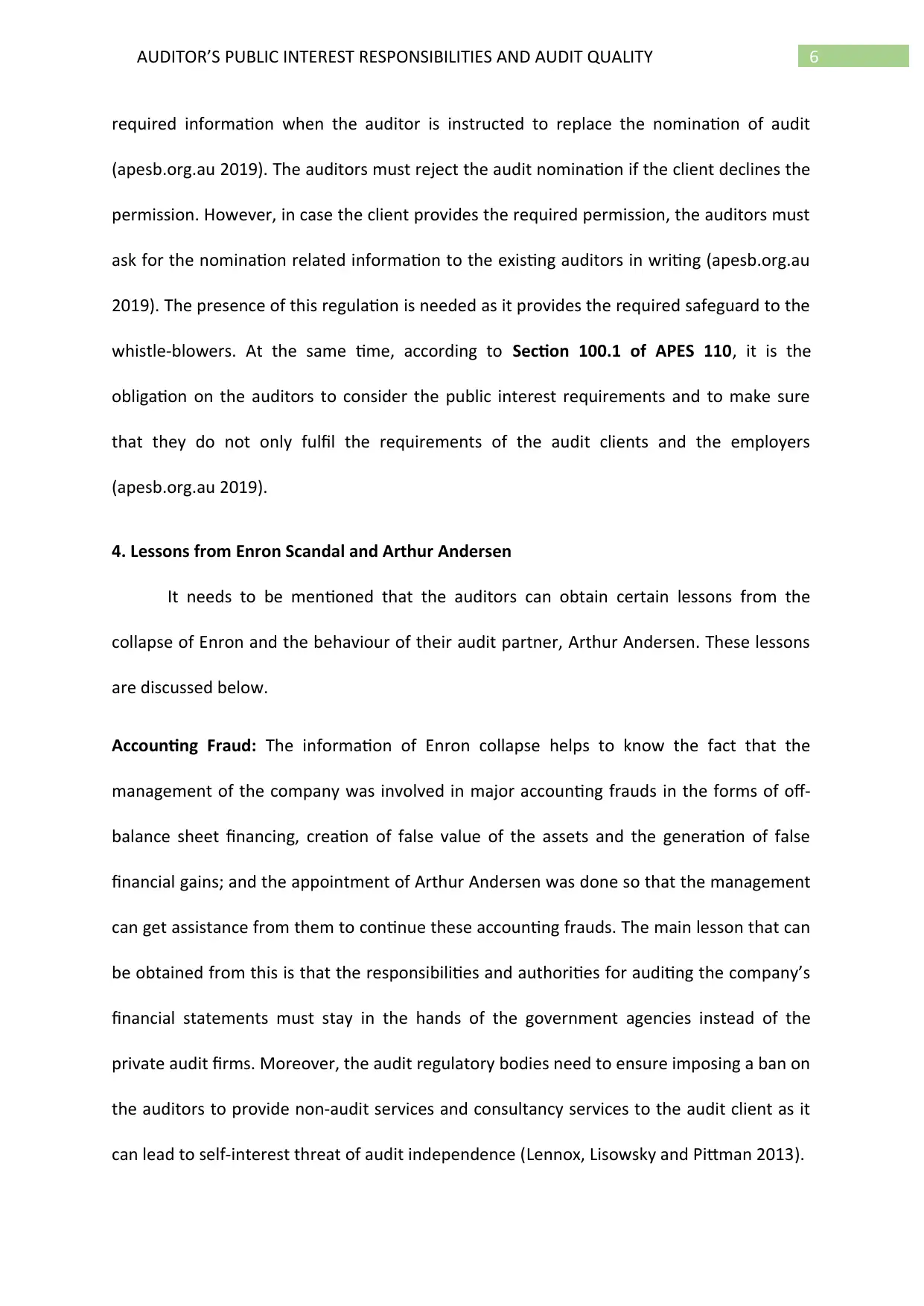
6AUDITOR’S PUBLIC INTEREST RESPONSIBILITIES AND AUDIT QUALITY
required information when the auditor is instructed to replace the nomination of audit
(apesb.org.au 2019). The auditors must reject the audit nomination if the client declines the
permission. However, in case the client provides the required permission, the auditors must
ask for the nomination related information to the existing auditors in writing (apesb.org.au
2019). The presence of this regulation is needed as it provides the required safeguard to the
whistle-blowers. At the same time, according to Section 100.1 of APES 110, it is the
obligation on the auditors to consider the public interest requirements and to make sure
that they do not only fulfil the requirements of the audit clients and the employers
(apesb.org.au 2019).
4. Lessons from Enron Scandal and Arthur Andersen
It needs to be mentioned that the auditors can obtain certain lessons from the
collapse of Enron and the behaviour of their audit partner, Arthur Andersen. These lessons
are discussed below.
Accounting Fraud: The information of Enron collapse helps to know the fact that the
management of the company was involved in major accounting frauds in the forms of off-
balance sheet financing, creation of false value of the assets and the generation of false
financial gains; and the appointment of Arthur Andersen was done so that the management
can get assistance from them to continue these accounting frauds. The main lesson that can
be obtained from this is that the responsibilities and authorities for auditing the company’s
financial statements must stay in the hands of the government agencies instead of the
private audit firms. Moreover, the audit regulatory bodies need to ensure imposing a ban on
the auditors to provide non-audit services and consultancy services to the audit client as it
can lead to self-interest threat of audit independence (Lennox, Lisowsky and Pittman 2013).
required information when the auditor is instructed to replace the nomination of audit
(apesb.org.au 2019). The auditors must reject the audit nomination if the client declines the
permission. However, in case the client provides the required permission, the auditors must
ask for the nomination related information to the existing auditors in writing (apesb.org.au
2019). The presence of this regulation is needed as it provides the required safeguard to the
whistle-blowers. At the same time, according to Section 100.1 of APES 110, it is the
obligation on the auditors to consider the public interest requirements and to make sure
that they do not only fulfil the requirements of the audit clients and the employers
(apesb.org.au 2019).
4. Lessons from Enron Scandal and Arthur Andersen
It needs to be mentioned that the auditors can obtain certain lessons from the
collapse of Enron and the behaviour of their audit partner, Arthur Andersen. These lessons
are discussed below.
Accounting Fraud: The information of Enron collapse helps to know the fact that the
management of the company was involved in major accounting frauds in the forms of off-
balance sheet financing, creation of false value of the assets and the generation of false
financial gains; and the appointment of Arthur Andersen was done so that the management
can get assistance from them to continue these accounting frauds. The main lesson that can
be obtained from this is that the responsibilities and authorities for auditing the company’s
financial statements must stay in the hands of the government agencies instead of the
private audit firms. Moreover, the audit regulatory bodies need to ensure imposing a ban on
the auditors to provide non-audit services and consultancy services to the audit client as it
can lead to self-interest threat of audit independence (Lennox, Lisowsky and Pittman 2013).
Paraphrase This Document
Need a fresh take? Get an instant paraphrase of this document with our AI Paraphraser
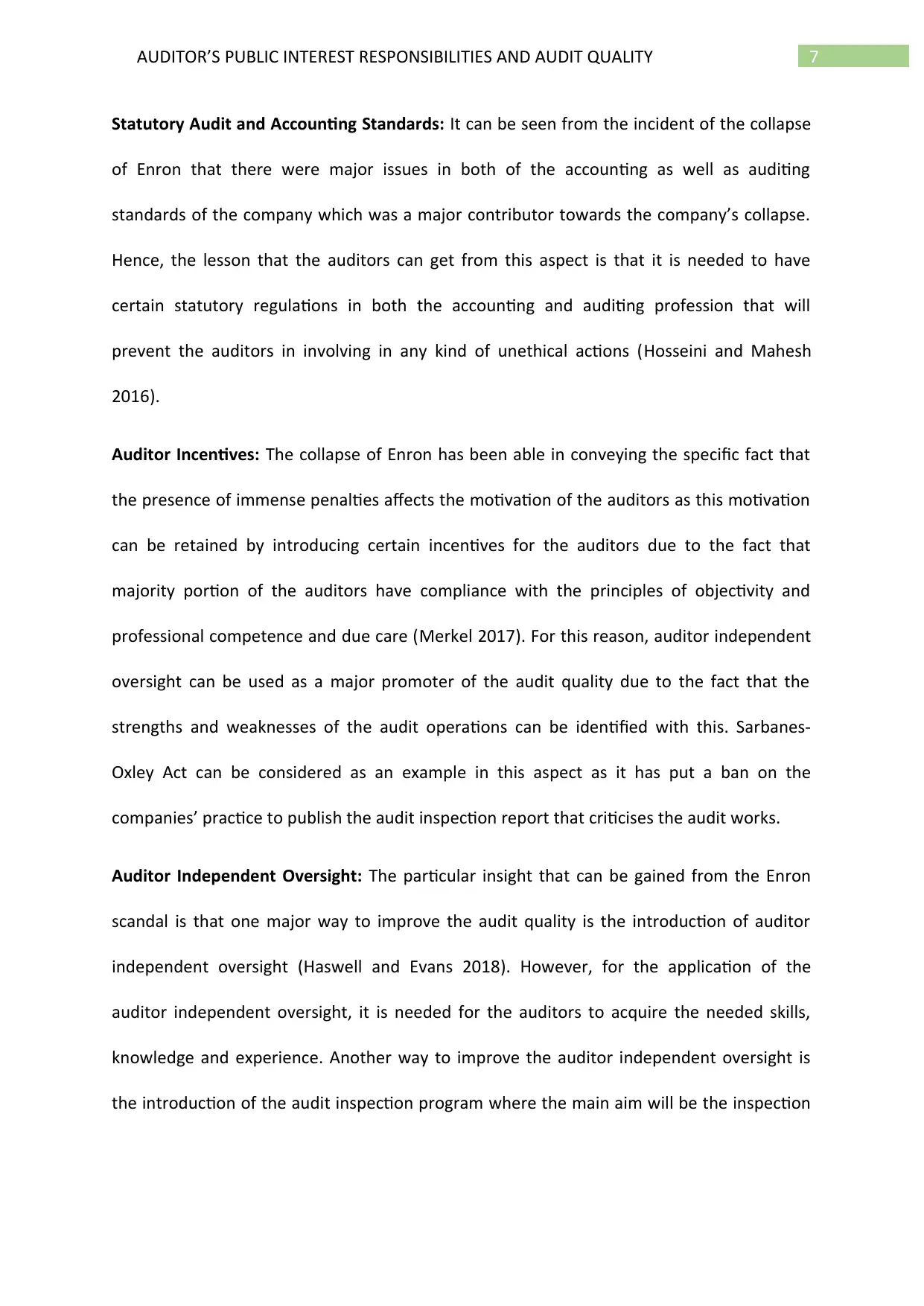
7AUDITOR’S PUBLIC INTEREST RESPONSIBILITIES AND AUDIT QUALITY
Statutory Audit and Accounting Standards: It can be seen from the incident of the collapse
of Enron that there were major issues in both of the accounting as well as auditing
standards of the company which was a major contributor towards the company’s collapse.
Hence, the lesson that the auditors can get from this aspect is that it is needed to have
certain statutory regulations in both the accounting and auditing profession that will
prevent the auditors in involving in any kind of unethical actions (Hosseini and Mahesh
2016).
Auditor Incentives: The collapse of Enron has been able in conveying the specific fact that
the presence of immense penalties affects the motivation of the auditors as this motivation
can be retained by introducing certain incentives for the auditors due to the fact that
majority portion of the auditors have compliance with the principles of objectivity and
professional competence and due care (Merkel 2017). For this reason, auditor independent
oversight can be used as a major promoter of the audit quality due to the fact that the
strengths and weaknesses of the audit operations can be identified with this. Sarbanes-
Oxley Act can be considered as an example in this aspect as it has put a ban on the
companies’ practice to publish the audit inspection report that criticises the audit works.
Auditor Independent Oversight: The particular insight that can be gained from the Enron
scandal is that one major way to improve the audit quality is the introduction of auditor
independent oversight (Haswell and Evans 2018). However, for the application of the
auditor independent oversight, it is needed for the auditors to acquire the needed skills,
knowledge and experience. Another way to improve the auditor independent oversight is
the introduction of the audit inspection program where the main aim will be the inspection
Statutory Audit and Accounting Standards: It can be seen from the incident of the collapse
of Enron that there were major issues in both of the accounting as well as auditing
standards of the company which was a major contributor towards the company’s collapse.
Hence, the lesson that the auditors can get from this aspect is that it is needed to have
certain statutory regulations in both the accounting and auditing profession that will
prevent the auditors in involving in any kind of unethical actions (Hosseini and Mahesh
2016).
Auditor Incentives: The collapse of Enron has been able in conveying the specific fact that
the presence of immense penalties affects the motivation of the auditors as this motivation
can be retained by introducing certain incentives for the auditors due to the fact that
majority portion of the auditors have compliance with the principles of objectivity and
professional competence and due care (Merkel 2017). For this reason, auditor independent
oversight can be used as a major promoter of the audit quality due to the fact that the
strengths and weaknesses of the audit operations can be identified with this. Sarbanes-
Oxley Act can be considered as an example in this aspect as it has put a ban on the
companies’ practice to publish the audit inspection report that criticises the audit works.
Auditor Independent Oversight: The particular insight that can be gained from the Enron
scandal is that one major way to improve the audit quality is the introduction of auditor
independent oversight (Haswell and Evans 2018). However, for the application of the
auditor independent oversight, it is needed for the auditors to acquire the needed skills,
knowledge and experience. Another way to improve the auditor independent oversight is
the introduction of the audit inspection program where the main aim will be the inspection
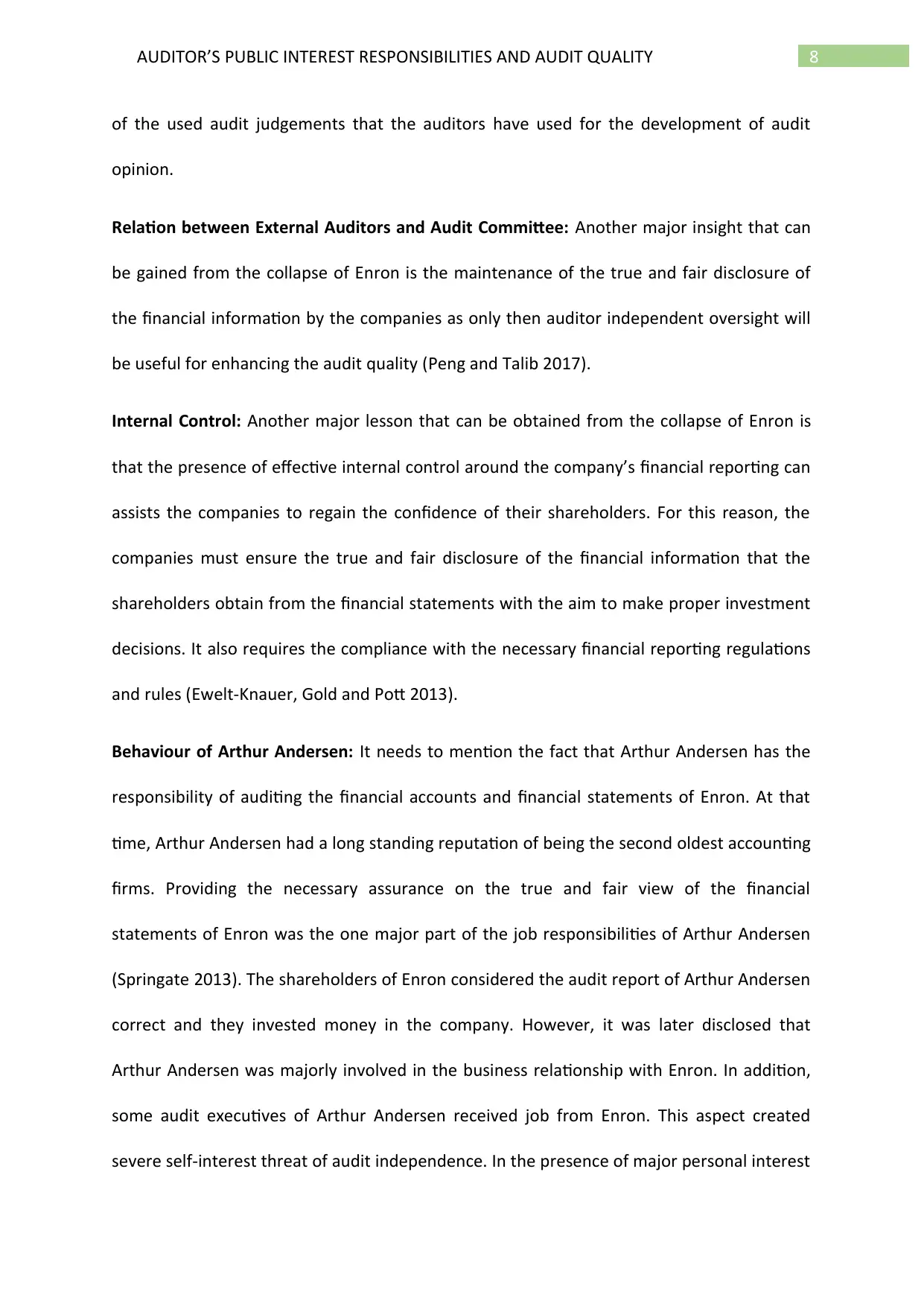
8AUDITOR’S PUBLIC INTEREST RESPONSIBILITIES AND AUDIT QUALITY
of the used audit judgements that the auditors have used for the development of audit
opinion.
Relation between External Auditors and Audit Committee: Another major insight that can
be gained from the collapse of Enron is the maintenance of the true and fair disclosure of
the financial information by the companies as only then auditor independent oversight will
be useful for enhancing the audit quality (Peng and Talib 2017).
Internal Control: Another major lesson that can be obtained from the collapse of Enron is
that the presence of effective internal control around the company’s financial reporting can
assists the companies to regain the confidence of their shareholders. For this reason, the
companies must ensure the true and fair disclosure of the financial information that the
shareholders obtain from the financial statements with the aim to make proper investment
decisions. It also requires the compliance with the necessary financial reporting regulations
and rules (Ewelt-Knauer, Gold and Pott 2013).
Behaviour of Arthur Andersen: It needs to mention the fact that Arthur Andersen has the
responsibility of auditing the financial accounts and financial statements of Enron. At that
time, Arthur Andersen had a long standing reputation of being the second oldest accounting
firms. Providing the necessary assurance on the true and fair view of the financial
statements of Enron was the one major part of the job responsibilities of Arthur Andersen
(Springate 2013). The shareholders of Enron considered the audit report of Arthur Andersen
correct and they invested money in the company. However, it was later disclosed that
Arthur Andersen was majorly involved in the business relationship with Enron. In addition,
some audit executives of Arthur Andersen received job from Enron. This aspect created
severe self-interest threat of audit independence. In the presence of major personal interest
of the used audit judgements that the auditors have used for the development of audit
opinion.
Relation between External Auditors and Audit Committee: Another major insight that can
be gained from the collapse of Enron is the maintenance of the true and fair disclosure of
the financial information by the companies as only then auditor independent oversight will
be useful for enhancing the audit quality (Peng and Talib 2017).
Internal Control: Another major lesson that can be obtained from the collapse of Enron is
that the presence of effective internal control around the company’s financial reporting can
assists the companies to regain the confidence of their shareholders. For this reason, the
companies must ensure the true and fair disclosure of the financial information that the
shareholders obtain from the financial statements with the aim to make proper investment
decisions. It also requires the compliance with the necessary financial reporting regulations
and rules (Ewelt-Knauer, Gold and Pott 2013).
Behaviour of Arthur Andersen: It needs to mention the fact that Arthur Andersen has the
responsibility of auditing the financial accounts and financial statements of Enron. At that
time, Arthur Andersen had a long standing reputation of being the second oldest accounting
firms. Providing the necessary assurance on the true and fair view of the financial
statements of Enron was the one major part of the job responsibilities of Arthur Andersen
(Springate 2013). The shareholders of Enron considered the audit report of Arthur Andersen
correct and they invested money in the company. However, it was later disclosed that
Arthur Andersen was majorly involved in the business relationship with Enron. In addition,
some audit executives of Arthur Andersen received job from Enron. This aspect created
severe self-interest threat of audit independence. In the presence of major personal interest
⊘ This is a preview!⊘
Do you want full access?
Subscribe today to unlock all pages.

Trusted by 1+ million students worldwide
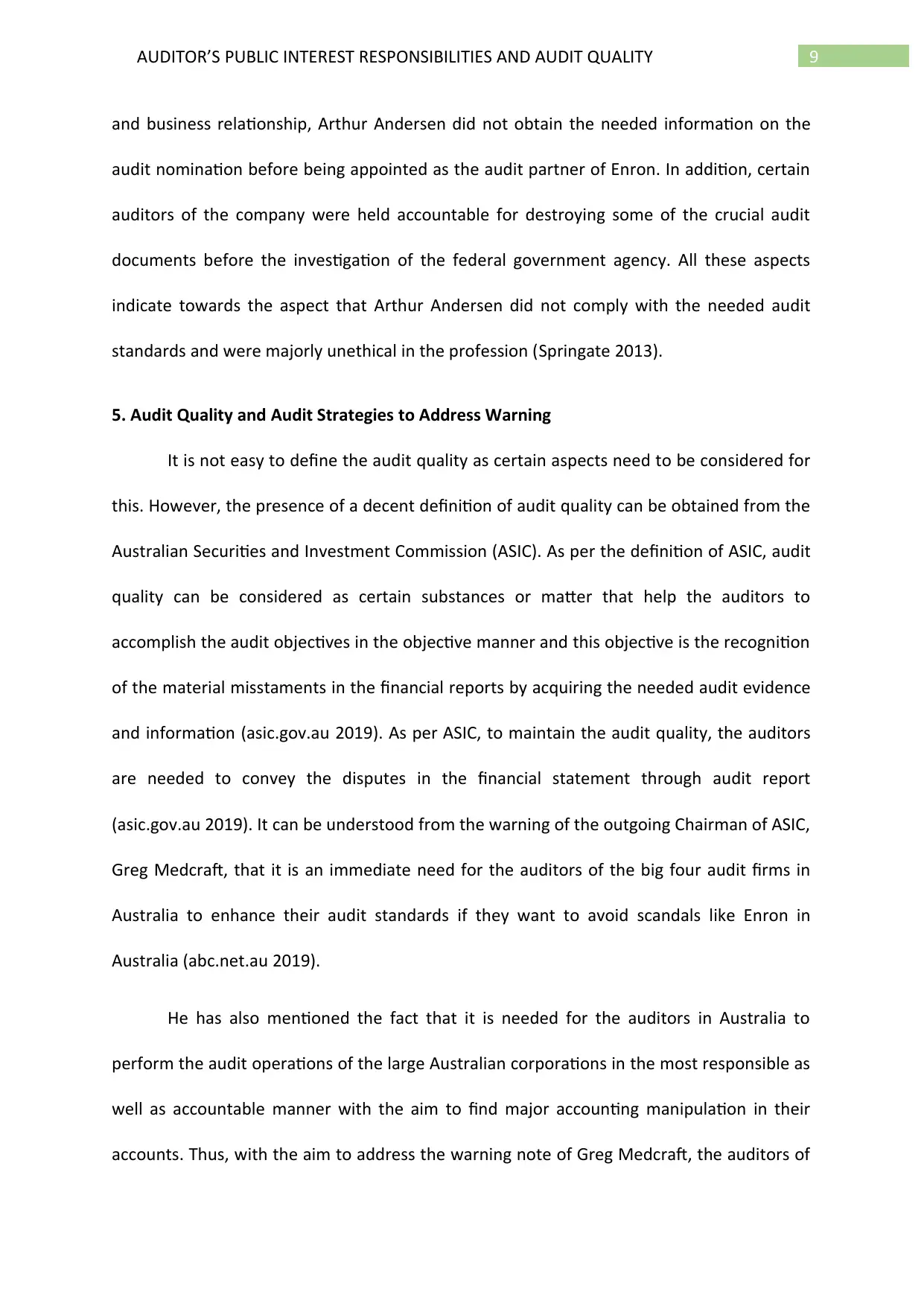
9AUDITOR’S PUBLIC INTEREST RESPONSIBILITIES AND AUDIT QUALITY
and business relationship, Arthur Andersen did not obtain the needed information on the
audit nomination before being appointed as the audit partner of Enron. In addition, certain
auditors of the company were held accountable for destroying some of the crucial audit
documents before the investigation of the federal government agency. All these aspects
indicate towards the aspect that Arthur Andersen did not comply with the needed audit
standards and were majorly unethical in the profession (Springate 2013).
5. Audit Quality and Audit Strategies to Address Warning
It is not easy to define the audit quality as certain aspects need to be considered for
this. However, the presence of a decent definition of audit quality can be obtained from the
Australian Securities and Investment Commission (ASIC). As per the definition of ASIC, audit
quality can be considered as certain substances or matter that help the auditors to
accomplish the audit objectives in the objective manner and this objective is the recognition
of the material misstaments in the financial reports by acquiring the needed audit evidence
and information (asic.gov.au 2019). As per ASIC, to maintain the audit quality, the auditors
are needed to convey the disputes in the financial statement through audit report
(asic.gov.au 2019). It can be understood from the warning of the outgoing Chairman of ASIC,
Greg Medcraft, that it is an immediate need for the auditors of the big four audit firms in
Australia to enhance their audit standards if they want to avoid scandals like Enron in
Australia (abc.net.au 2019).
He has also mentioned the fact that it is needed for the auditors in Australia to
perform the audit operations of the large Australian corporations in the most responsible as
well as accountable manner with the aim to find major accounting manipulation in their
accounts. Thus, with the aim to address the warning note of Greg Medcraft, the auditors of
and business relationship, Arthur Andersen did not obtain the needed information on the
audit nomination before being appointed as the audit partner of Enron. In addition, certain
auditors of the company were held accountable for destroying some of the crucial audit
documents before the investigation of the federal government agency. All these aspects
indicate towards the aspect that Arthur Andersen did not comply with the needed audit
standards and were majorly unethical in the profession (Springate 2013).
5. Audit Quality and Audit Strategies to Address Warning
It is not easy to define the audit quality as certain aspects need to be considered for
this. However, the presence of a decent definition of audit quality can be obtained from the
Australian Securities and Investment Commission (ASIC). As per the definition of ASIC, audit
quality can be considered as certain substances or matter that help the auditors to
accomplish the audit objectives in the objective manner and this objective is the recognition
of the material misstaments in the financial reports by acquiring the needed audit evidence
and information (asic.gov.au 2019). As per ASIC, to maintain the audit quality, the auditors
are needed to convey the disputes in the financial statement through audit report
(asic.gov.au 2019). It can be understood from the warning of the outgoing Chairman of ASIC,
Greg Medcraft, that it is an immediate need for the auditors of the big four audit firms in
Australia to enhance their audit standards if they want to avoid scandals like Enron in
Australia (abc.net.au 2019).
He has also mentioned the fact that it is needed for the auditors in Australia to
perform the audit operations of the large Australian corporations in the most responsible as
well as accountable manner with the aim to find major accounting manipulation in their
accounts. Thus, with the aim to address the warning note of Greg Medcraft, the auditors of
Paraphrase This Document
Need a fresh take? Get an instant paraphrase of this document with our AI Paraphraser
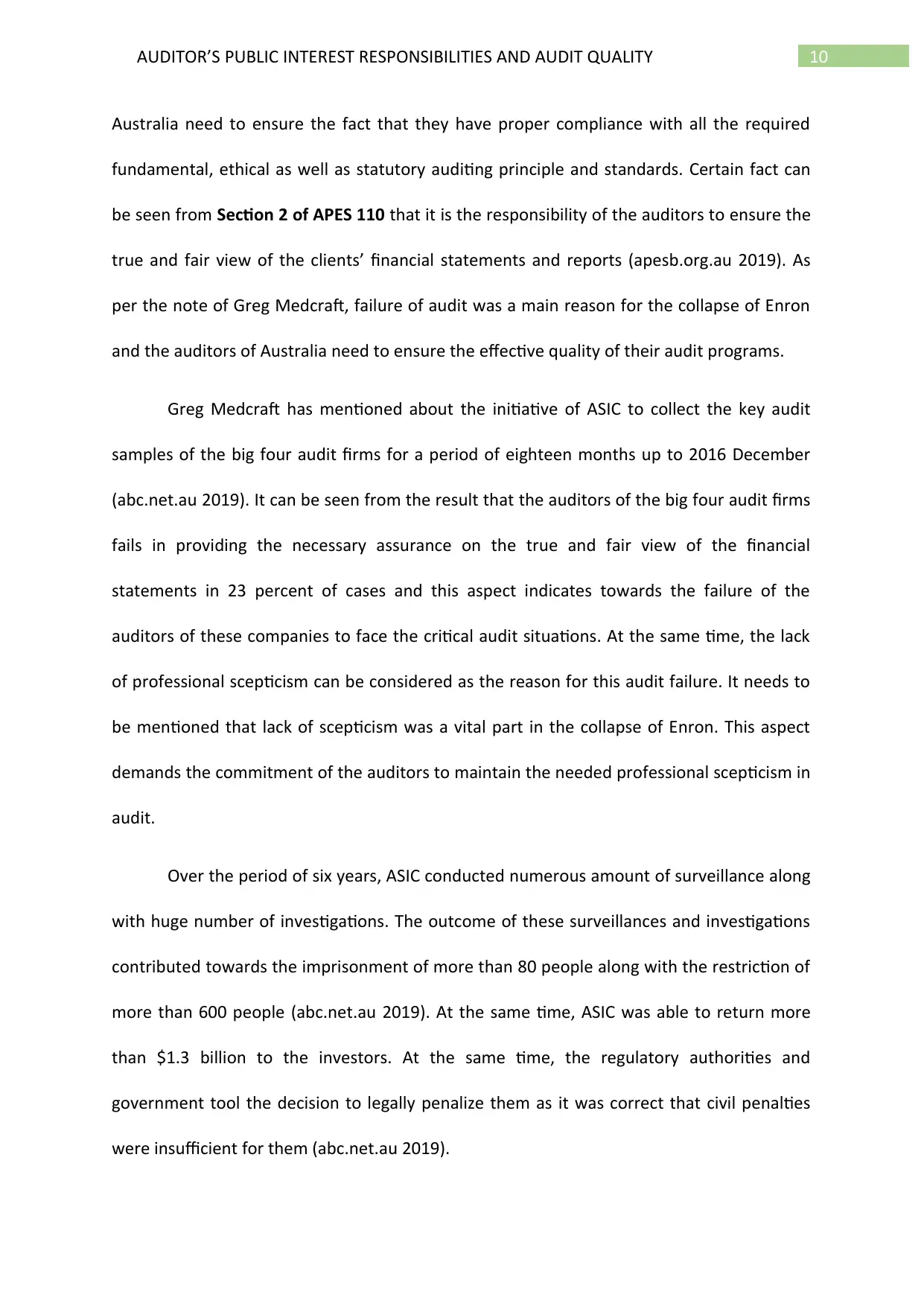
10AUDITOR’S PUBLIC INTEREST RESPONSIBILITIES AND AUDIT QUALITY
Australia need to ensure the fact that they have proper compliance with all the required
fundamental, ethical as well as statutory auditing principle and standards. Certain fact can
be seen from Section 2 of APES 110 that it is the responsibility of the auditors to ensure the
true and fair view of the clients’ financial statements and reports (apesb.org.au 2019). As
per the note of Greg Medcraft, failure of audit was a main reason for the collapse of Enron
and the auditors of Australia need to ensure the effective quality of their audit programs.
Greg Medcraft has mentioned about the initiative of ASIC to collect the key audit
samples of the big four audit firms for a period of eighteen months up to 2016 December
(abc.net.au 2019). It can be seen from the result that the auditors of the big four audit firms
fails in providing the necessary assurance on the true and fair view of the financial
statements in 23 percent of cases and this aspect indicates towards the failure of the
auditors of these companies to face the critical audit situations. At the same time, the lack
of professional scepticism can be considered as the reason for this audit failure. It needs to
be mentioned that lack of scepticism was a vital part in the collapse of Enron. This aspect
demands the commitment of the auditors to maintain the needed professional scepticism in
audit.
Over the period of six years, ASIC conducted numerous amount of surveillance along
with huge number of investigations. The outcome of these surveillances and investigations
contributed towards the imprisonment of more than 80 people along with the restriction of
more than 600 people (abc.net.au 2019). At the same time, ASIC was able to return more
than $1.3 billion to the investors. At the same time, the regulatory authorities and
government tool the decision to legally penalize them as it was correct that civil penalties
were insufficient for them (abc.net.au 2019).
Australia need to ensure the fact that they have proper compliance with all the required
fundamental, ethical as well as statutory auditing principle and standards. Certain fact can
be seen from Section 2 of APES 110 that it is the responsibility of the auditors to ensure the
true and fair view of the clients’ financial statements and reports (apesb.org.au 2019). As
per the note of Greg Medcraft, failure of audit was a main reason for the collapse of Enron
and the auditors of Australia need to ensure the effective quality of their audit programs.
Greg Medcraft has mentioned about the initiative of ASIC to collect the key audit
samples of the big four audit firms for a period of eighteen months up to 2016 December
(abc.net.au 2019). It can be seen from the result that the auditors of the big four audit firms
fails in providing the necessary assurance on the true and fair view of the financial
statements in 23 percent of cases and this aspect indicates towards the failure of the
auditors of these companies to face the critical audit situations. At the same time, the lack
of professional scepticism can be considered as the reason for this audit failure. It needs to
be mentioned that lack of scepticism was a vital part in the collapse of Enron. This aspect
demands the commitment of the auditors to maintain the needed professional scepticism in
audit.
Over the period of six years, ASIC conducted numerous amount of surveillance along
with huge number of investigations. The outcome of these surveillances and investigations
contributed towards the imprisonment of more than 80 people along with the restriction of
more than 600 people (abc.net.au 2019). At the same time, ASIC was able to return more
than $1.3 billion to the investors. At the same time, the regulatory authorities and
government tool the decision to legally penalize them as it was correct that civil penalties
were insufficient for them (abc.net.au 2019).
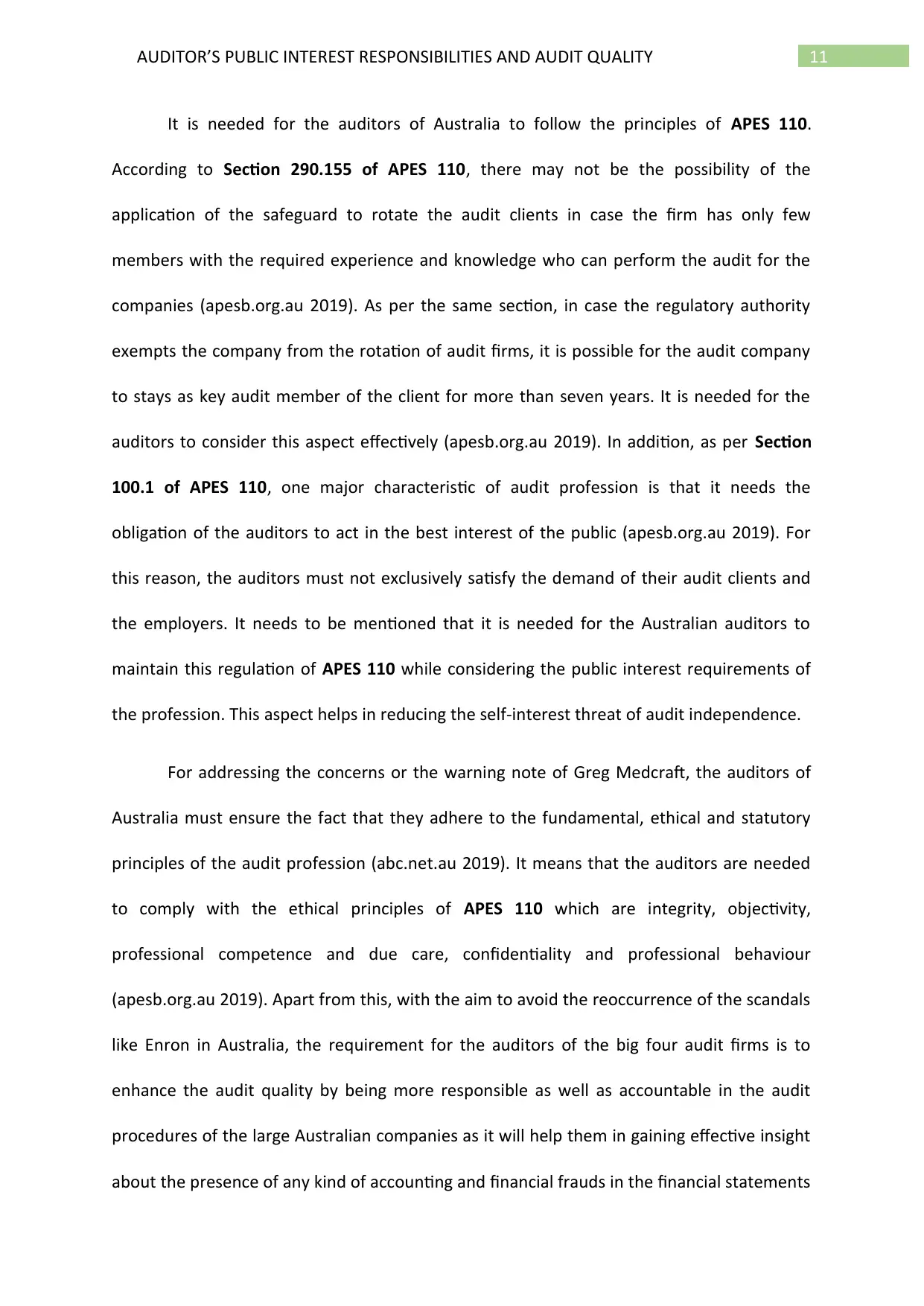
11AUDITOR’S PUBLIC INTEREST RESPONSIBILITIES AND AUDIT QUALITY
It is needed for the auditors of Australia to follow the principles of APES 110.
According to Section 290.155 of APES 110, there may not be the possibility of the
application of the safeguard to rotate the audit clients in case the firm has only few
members with the required experience and knowledge who can perform the audit for the
companies (apesb.org.au 2019). As per the same section, in case the regulatory authority
exempts the company from the rotation of audit firms, it is possible for the audit company
to stays as key audit member of the client for more than seven years. It is needed for the
auditors to consider this aspect effectively (apesb.org.au 2019). In addition, as per Section
100.1 of APES 110, one major characteristic of audit profession is that it needs the
obligation of the auditors to act in the best interest of the public (apesb.org.au 2019). For
this reason, the auditors must not exclusively satisfy the demand of their audit clients and
the employers. It needs to be mentioned that it is needed for the Australian auditors to
maintain this regulation of APES 110 while considering the public interest requirements of
the profession. This aspect helps in reducing the self-interest threat of audit independence.
For addressing the concerns or the warning note of Greg Medcraft, the auditors of
Australia must ensure the fact that they adhere to the fundamental, ethical and statutory
principles of the audit profession (abc.net.au 2019). It means that the auditors are needed
to comply with the ethical principles of APES 110 which are integrity, objectivity,
professional competence and due care, confidentiality and professional behaviour
(apesb.org.au 2019). Apart from this, with the aim to avoid the reoccurrence of the scandals
like Enron in Australia, the requirement for the auditors of the big four audit firms is to
enhance the audit quality by being more responsible as well as accountable in the audit
procedures of the large Australian companies as it will help them in gaining effective insight
about the presence of any kind of accounting and financial frauds in the financial statements
It is needed for the auditors of Australia to follow the principles of APES 110.
According to Section 290.155 of APES 110, there may not be the possibility of the
application of the safeguard to rotate the audit clients in case the firm has only few
members with the required experience and knowledge who can perform the audit for the
companies (apesb.org.au 2019). As per the same section, in case the regulatory authority
exempts the company from the rotation of audit firms, it is possible for the audit company
to stays as key audit member of the client for more than seven years. It is needed for the
auditors to consider this aspect effectively (apesb.org.au 2019). In addition, as per Section
100.1 of APES 110, one major characteristic of audit profession is that it needs the
obligation of the auditors to act in the best interest of the public (apesb.org.au 2019). For
this reason, the auditors must not exclusively satisfy the demand of their audit clients and
the employers. It needs to be mentioned that it is needed for the Australian auditors to
maintain this regulation of APES 110 while considering the public interest requirements of
the profession. This aspect helps in reducing the self-interest threat of audit independence.
For addressing the concerns or the warning note of Greg Medcraft, the auditors of
Australia must ensure the fact that they adhere to the fundamental, ethical and statutory
principles of the audit profession (abc.net.au 2019). It means that the auditors are needed
to comply with the ethical principles of APES 110 which are integrity, objectivity,
professional competence and due care, confidentiality and professional behaviour
(apesb.org.au 2019). Apart from this, with the aim to avoid the reoccurrence of the scandals
like Enron in Australia, the requirement for the auditors of the big four audit firms is to
enhance the audit quality by being more responsible as well as accountable in the audit
procedures of the large Australian companies as it will help them in gaining effective insight
about the presence of any kind of accounting and financial frauds in the financial statements
⊘ This is a preview!⊘
Do you want full access?
Subscribe today to unlock all pages.

Trusted by 1+ million students worldwide
1 out of 17
Related Documents
Your All-in-One AI-Powered Toolkit for Academic Success.
+13062052269
info@desklib.com
Available 24*7 on WhatsApp / Email
![[object Object]](/_next/static/media/star-bottom.7253800d.svg)
Unlock your academic potential
Copyright © 2020–2026 A2Z Services. All Rights Reserved. Developed and managed by ZUCOL.





